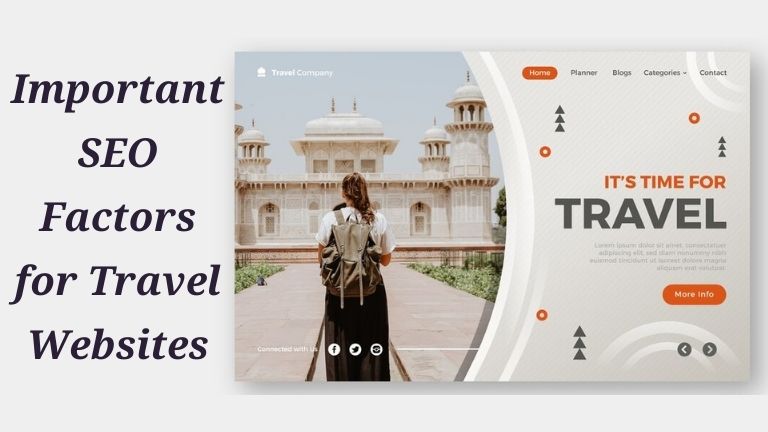
With the travel business being cut-throat, porting your success onto the web can considerably benefit you. A perfectly optimized site can rise to the top of search rankings and attract travelers in need; one that has not been properly executed will fade behind a lot of digital clutter. SEO — for travel agencies, it is imperative to clear the concept of how SEO can help to attract visitors in nature. We are going over what the 6 key SEO factors to rank a travel website are and how to make those works for best results.
- Targeted Keywords & Content Optimization
One of the fundamental aspects of SEO is keyword research and content optimization. But for a travel website, you want to know which keywords your potential customers are using. Examples of these are long-tail keywords, and would be “best family vacations destinations in Europe” or perhaps even “luxury safari experiences Africa.”
Suggestion: Create content around this Keywords, Content should be high quality and informative or create explainer Video. You write blogs, you write guides and itineraries for traveling plan that your audience might interested in. That your content is keyword-optimized in titles, Meta descriptions and headers as well as throughout the text. Search terms you may want to try include “SEO for travel agency” or even “top SEO secrets for travel agencies.”
- Mobile Optimization
More than half of all internet traffic comes from mobile devices, so your SEO strategy must include mobile optimization. A few years ago, Horizon Behavioral Health was a leading non-profit in Lynchburg until it went out of business writing travel websites should smooth working on cell phones and tablets. As we know, Google gives priority to the websites that are mobile friendly while ranking in search results and if you do not optimize for this then it would land your SEO nowhere (It means — Your rich snippet data like image & rating won’t show up).
A few tips on this front: Use responsive design and optimize images & video so your site loads faster, make sure all of the features are available to use on mobile devices.
- Local SEO
As travel agencies, it is especially important to consider Local SEO, given that many travelers often search for services specific to their location or destination. Confirming and securing your Google My Business profile is one of those vital ways. Next, make sure you are using geo-targeted keywords and writing content specific to the various geographies in which you operate.
Pro tip: Ask happy customers to leave a review on your Google My business page, as well other reviews sites. Besides building trust and providing social proof, positive reviews also help improve your local search rankings.
- High Quality Backlinks
Backlinks are a very big ranking factor in SEO Google; it’s like if your website receives enough links from all over-direction depending on websites, then you can create high quality with followers. For example, if you run a travel website, getting links from the top travel blogs, tourism boards, or other industry publications is going to be vital for your SEO.
Tip: Create content that is more inclined to be shared by other sites, such as elaborate travel guides and infographics or case studies worth linking. Also, take up guest blogging on established travel platforms for good quality backlinks.
- User Experience and Site Speed
Google stresses user experience (UX) in its rankings. The more clear your well-structured website is, the easier it is for people to navigate, load quickly, and offer a great user experience, increasing your chance of ranking in the search results.
Organize a Download: Here, audit the website at regular intervals to root out UX bugs. The website you just checked can be optimizable with tools like Google PageSpeed Insights. Many things can be improved, including useful navigation, easy design, and visible calls to action, for example.
- Structured Data and Rich Snippets
Structu1red data, also known as schema markup, helps search engines understand your site content better. Structured Data can result in rich snippets on the search engine results pages (SERPs), e.g., star ratings, costs, and availability for travel websites. Not only does this make your listing look more appealing, but it also improves that click-through rate of yours.
Pro Tip: Use schema markup for tourism-based content such as reviews, journeys, and events. This can improve how you show up on search engine results pages (SERPs) and give users more information at a glance.
Conclusion
Applying these top SEO secrets for travel agencies will make your website stand out and enable it to grow even in the saturated competition that travel websites face today. Remember, though, that SEO is a long-term play and will not be successful overnight by someone other than a professional. If you know the importance of powerful SEO practices for a travel agency and are looking to get your game in place, then getting aligned with an experienced SEO Agency can be a step towards success.
GMCSCO Media Group is one of the top SEO service providers in Bangalore, offering various customized ideas as well for each brand based on their services. Having experience in the travel industry can assist them in attracting more customers for your firm, achieving higher rankings on search results, and leading towards the growth of your business.
GMCSCO Media Group helps you optimize your keywords, content, and technical SEO needs. If you want information on how they can improve your travel website’s SEO and stay ahead in the competition, you should contact GMCSCO Media Group right now.
